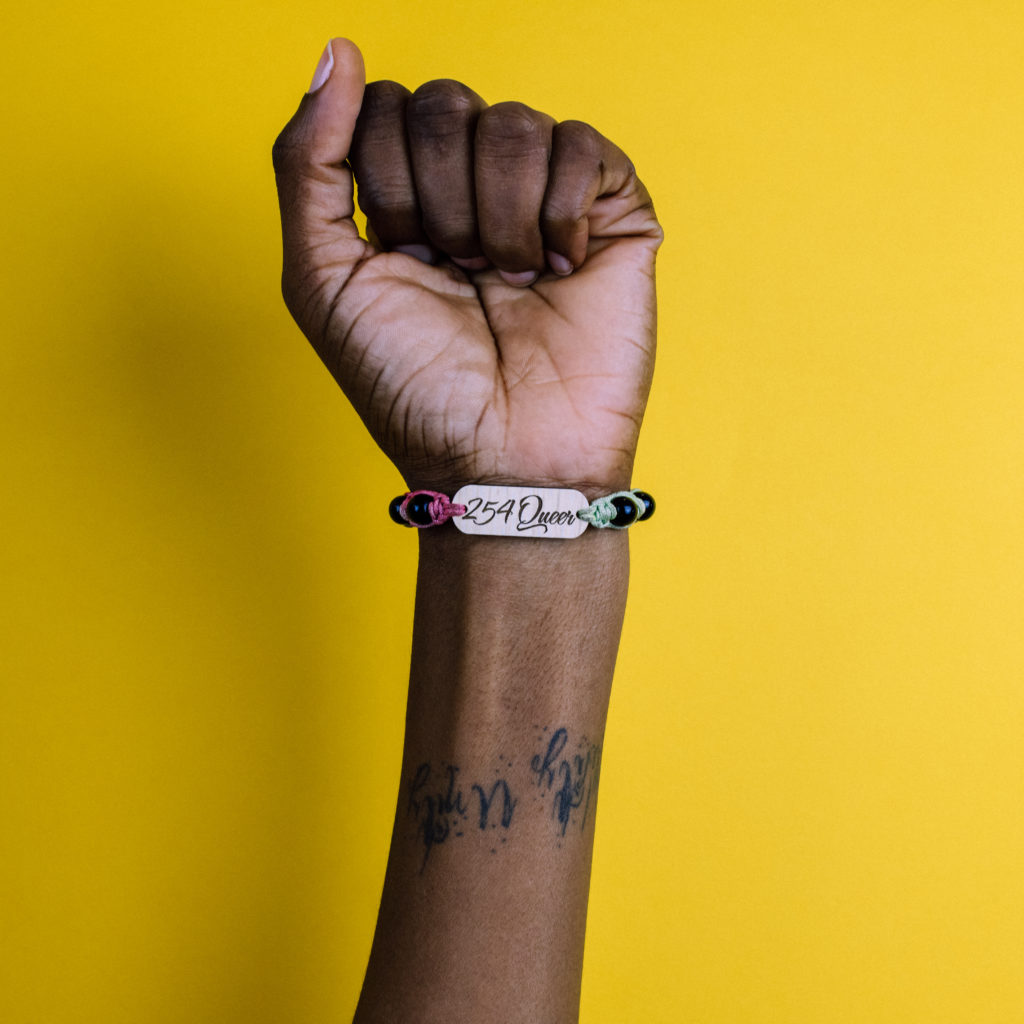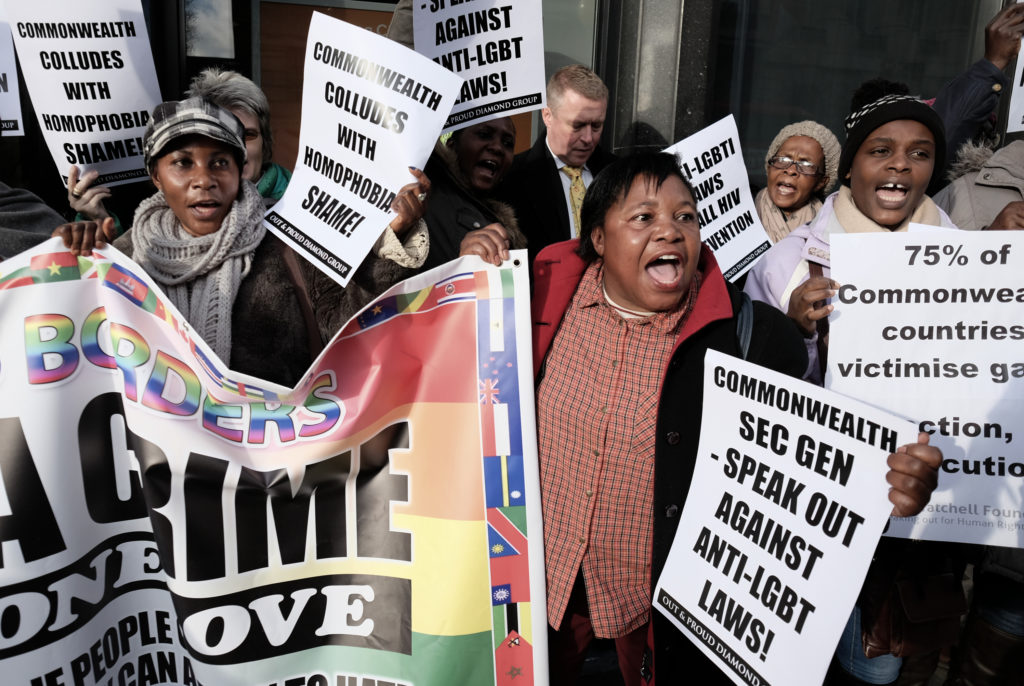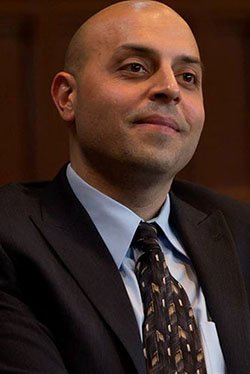
The 2019 publication of Adriaan van Klinken’s Kenyan Christian Queer: Religion, LGBT Activism, and Arts of Resistance in Africa marks a critical moment for the fields of queer studies, African studies, religious studies, and postcolonial studies. Van Klinken’s book provides scholars with a model to theorize African political subjectivities where queerness and Christianity are mutually reinforcing rather than in opposition. He examines the contemporary Kenyan context, centering four case studies of the arts as activism, or “artivism.” One chapter focuses on the work of the queer Kenyan public figure Binyavanga Wainaina, another examines gay musician George Barasa’s “Same Love” music video, the next discusses the queer narratives of the Stories of Our Lives anthology project, and the final case study explores the queer Cosmopolitan Affirming Church in Nairobi. Van Klinken interweaves autoethnographic reflections with interludes between these chapters.
In this essay, I draw upon Kenyan, Christian, Queer as a launching pad to think through decolonizing queer studies more broadly. Van Klinken is explicit in his commitment to decolonizing queer studies and he achieves this by problematizing western assumptions about queerness outside of the west. He utilizes Africa-based archives and methods and centers the voices of queer African thinkers and artists. He is also attuned to how “overcoming homophobia is a matter of decolonization” (34).
It is analytically useful to bring anthropologist George Paul Meiu’s 2017 book Ethno-erotic Economies: Sexuality, Money, and Belonging in Kenya, into conversation with van Klinken. Both scholars are invested in understanding African sexualities, have conducted fieldwork in contemporary Kenyan societies, recognize Kenya’s linkages to global domains, take historical colonialism and present postcolonial conditions into account, and contribute to queer studies.
Meiu ethnographically examines the phenomenon of young Samburu men from Northern Kenya who engage in sex tourism with older European women in coastal towns. These men perform Maasai moran warrior stereotypes in order to secure resources from these women, which in turn transforms their wealth and relationships with their communities in their home villages. Thus, while van Klinken’s analysis is focused on the middle class and more privileged Kenyans with access to urban and cosmopolitan networks, Meiu’s research is grounded in rural contexts and among poorer Kenyans. All of these Kenyans share a common heritage from British colonialism and postcolonial Kenyan elite governance. While the queer subjects in van Klinken’s book can forge solidarity with their queer counterparts in the west, the heterosexual subjects in Meiu’s text are mired in racialized/otherized/fetishized relationships with western tourists. Furthermore, Meiu explicates how ethnic categorizations undergirded colonial rule and postcolonial social engineering. This categorization does not factor in van Klinken’s analysis nearly as much. While van Klinken briefly acknowledges class in his analysis, economic factors are central for Meiu whose work is at the intersection of economy, ethnicity, and sexuality.
Both authors delineate connections between colonialism and sexuality in Kenya. Van Klinken is cognizant of British colonial homophobia that significantly departed from indigenous Kenyan queer tolerant attitudes. Meiu traces British colonial perceptions of Samburu men as security threats whose bodies and desires need to be controlled. While van Klinken’s research subjects are queer, his text does not reveal much about the sexual aspects of homosexuality. On the other hand, Meiu dives into the sex acts underlying the heterosexual tourist-native relationships of his research subjects. While the former scholar conceptualizes queerness in terms of non-normative and same-sex gender and sexuality, the latter defines queerness in a broader sense that relates to temporality and momentary disruptions of age hierarchies and social roles.
Both authors also outline connections between colonialism and religion. Van Klinken insists on postsecular scholarship that accounts for religion in analytically robust ways, while Meiu’s references to religion are brief. Meiu relates how Christian attitudes are related to particular notions of morality, developmentalism, and what should be the “proper” modern Kenyan subject. Van Klinken’s genealogy of Christianity in Kenya is extensive. He gives attention to the British-era penal code against “unnatural acts” and its adoption into law in 1963 by postcolonial elites, while also paying attention to how this has impacted Kenyan Christian sensibilities. Moreover, he is conscious of the role of Christian missionaries from the west in African colonization, and the continued realities of western Christian imperialism in Kenya and other parts of the African continent.

Van Klinken references postcolonial theorist Homi Bhabha’s notion of interstice to theorize “interstitial or intervening space” and “interstitial intimacy” to challenge “binary divisions through which . . . spheres of social experience are often spatially opposed” (142). This epistemological approach of paying attention to the interstitial is critical to the decolonization of queer studies. Reading Van Klinken alongside Meiu queers our understanding of queerness to encompass broader norms related to patriarchy, in terms of both gender and stage of life. The work of these two scholars together queers understandings of Kenya beyond a rural versus cosmopolitan binary. We also come to see how Christianity can be both imperial and indigenous in Kenya, in addition to the interstices between the colonial and the postcolonial. Van Klinken’s conceptualization of the religious is expansive, broadening conceptions of the prophetic, liturgical, or even theological. Furthermore, while both scholars are European, they demonstrate the potential to decolonize queer studies in the Global South through rich analysis that is grounded in privileging the knowledge, imaginaries, and world-making of African subjects.
We can also advance the decolonization of queer studies by increasing the space for South-South epistemologies and solidarities. I approach these questions as a Palestinian scholar of queerness in Palestine (having published the book Queer Palestine and the Empire of Critique). Like Kenya, Palestine was colonized by the British, and it exists in the Middle East/North Africa region that must contend with the legacies of colonial homophobia as well. Moreover, LGBTQ Palestinian Christians queer the binary of Christianity as indigenous vs. imperialist in Palestine. Palestinian Christians suffer from Israeli military occupation and oppression that is largely sustained by western Christian Zionists, revealing the imperialist weaponization of Christianity by western actors committed to the subjugation of all Palestinians, both Christian and Muslim. Yet, Palestinian Christians are also cognizant of their experiences as indigenous Christians in Palestine, descendants of the land where Jesus was born, lived, and was crucified. For Palestinian Christians, Jesus was an anti-imperialist ancestor who challenged the Roman Empire. Thus, for queer Palestinian Christians, Christianity can simultaneously serve as a source of their spiritual violence as well as empowerment. When we are sensitive to nuanced and intimate analyses of queer subjects’ own understandings of their local moral worlds in the Global South, we contribute to the decolonization of queer studies.
During two recent book talks of my own, I experienced the power and potential of South-South queer intellectual and political exchange. One was at Swarthmore College, my home institution, where my brilliant colleague, Farid Azfar, who grew up in Pakistan, served as the discussant. We compared and contrasted the experiences of feminist activists in Pakistan and the queer social movement in Palestine. The other event was with Gautam Bhan, a queer scholar at the Indian Institute for Human Settlements. Bhan was a remarkable interlocutor who shared insights from his experience with the Indian queer community that resonated with what I have observed in Palestine over the years. With both events, it was refreshing not to have to turn to the White western gaze, and to be able to speak about non-normative gender and sexuality in the Global South without contending with Orientalist assumptions.
Van Klinken and Meiu also share a commitment to post-Orientalist scholarship. Without homogenizing Kenya or the Global South, we can place Kenya alongside other former domains of the British Empire, including Palestine, India, and Pakistan, to elucidate the queer imaginaries that animate the colonial and postcolonial world. It is through such multiplicity of analytical vantage points that the intellectual project of decolonizing queer studies can reach its potential.

